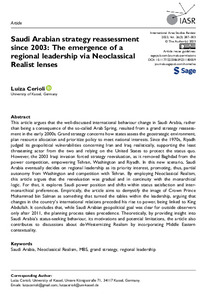| dcterms.abstract | This article argues that the well-discussed international behaviour change in Saudi Arabia, rather than being a consequence of the so-called Arab Spring, resulted from a grand strategy reassessment in the early 2000s. Grand strategy concerns how states assess the geostrategic environment, plan resource allocation and prioritize policy to meet national interests. Since the 1970s, Riyadh judged its geopolitical vulnerabilities concerning Iran and Iraq realistically, supporting the least threatening actor from the two and relying on the United States to protect the status quo. However, the 2003 Iraqi invasion forced strategy reevaluation, as it removed Baghdad from the power competition, empowering Tehran, Washington and Riyadh. In this new scenario, Saudi Arabia eventually decides on regional leadership as its priority interest, promoting, thus, partial autonomy from Washington and competition with Tehran. By employing Neoclassical Realism, this article argues that the reevaluation was gradual and in continuity with the monarchical logic. For that, it explores Saudi power position and shifts within status satisfaction and inter-monarchical preferences. Empirically, the article aims to demystify the image of Crown Prince Mohammad bin Salman as something that turned the tables within the leadership, arguing that changes in the country's international relations preceded his rise to power, being linked to King Abdullah. It concludes that, while Saudi Arabian geopolitical goal was clear for outside observers only after 2011, the planning process takes precedence. Theoretically, by providing insight into Saudi Arabia's status-seeking behaviour, its motivations and potential limitations, the article also contributes to discussions about de-Westernizing Realism by incorporating Middle Eastern contextuality. | eng |


